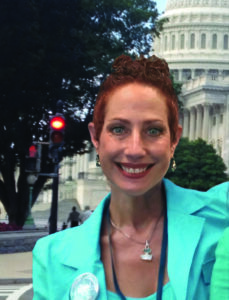 Marcie Paul
Marcie Paul
I was diagnosed with ovarian cancer in 2009 and like most, it was late stage. However, in contrast to the vast majority with late-stage disease, my cancer has not recurred.
At the time, I obviously didn’t know I’d be so inordinately fortunate. In fact, the outlook was pretty dire, and my only child, a daughter, was just 12 years old. Beyond survival, my foremost fear was how this would impact her at that formative age. As a result, I was determined to see her derive something positive from our family trauma no matter what my clinical outcome may be. That objective motivated me to stand up to the adversity. It led me to the realization that I can’t control if I have cancer, but I can control how I have cancer.
Advocacy provided an excellent vehicle because it fulfilled my need to be proactive and my desire to find purpose and meaning in having cancer. On the most basic level, I saw it as part of being an active partner in my healthcare. Moreover, I considered it my responsibility to fight for medical advances for my own disease. I can’t expect others to do it if I don’t myself. This is especially true since I’m part of a tragically small cohort of late-stage ovarian cancer survivors healthy enough to advocate. For this reason, I feel compelled to act on behalf of those who cannot and the many we all have lost.
My profound gratitude for my fortunate outcome continues to fuel my efforts to this day. These tend to fall under two different but complementary headings. As a policy and legislative advocate, I primarily chase after more federal research funding and better access to care. As a research advocate, I work to ensure that the research is patient-centric and meets the most crucial needs of our community.
Specifically, I’ve been an advocate with the Ovarian Cancer Research Alliance since 2011. Last fiscal year we played a critical role in helping to secure over $250 million in federal funding for ovarian cancer. Although the number itself is barely budget-dust, I focus on the trends and those line items allocated for ovarian. In the last decade or so, funding for the Department of Defense (DoD) Ovarian Cancer Research Program more than doubled and funding for two ovarian-related Centers for Disease Control and Prevention (CDC) programs has nearly tripled.
In short, advocacy is essential. Compelling stories can drive policy decisions and legislative action. Advocates connect programs and spending to individuals and families. While cancer research funding is nowhere near adequate, it still trends up and we have received many recent budget requests. Moreover, advocates and patient advocacy groups have successfully fought for better access to clinical trials, oral chemotherapy, and genetic testing as well as genetic discrimination protections, among other advocate-initiated efforts.
 Notably, Michigan became the 44th state to pass oral chemotherapy parity legislation just last fall. That hard fought win took over 15 years and, asan American Cancer Society Cancer Action Network Deputy District Lead, I was there for nearly half of them.
Notably, Michigan became the 44th state to pass oral chemotherapy parity legislation just last fall. That hard fought win took over 15 years and, asan American Cancer Society Cancer Action Network Deputy District Lead, I was there for nearly half of them.
As another local grassroots example, Johanna’s Law, or the Gynecologic Cancer Education and Awareness Act, was the work of a tireless Michigan advocate, Sheryl Silver. She named it after her sister, Johanna Silver Gordon, after losing her to ovarian cancer. Enacted in 2007, the centerpiece is the CDC educational initiative, the Inside Knowledge Campaign.
When I’m not walking the halls of Congress with every other interest group during appropriations season or stalking my state and federal policymakers via email, I serve on peer review panels for the DoD, Patient-Centered Outcomes Research Institute, and an Ovarian Cancer SPORE (Specialized Program of Research Excellence, funded by the National Cancer Institute) in Chicago. Also wearing my research hat, I provide input into the design of clinical trials to ensure the patient perspective is considered throughout, and I serve on a local Institutional Review Board.
POQC intrigues me because it involves standard of care treatment, which dovetails nicely with my research involvement. Moreover, POQC impacts a substantially larger part of the patient population, while possibly revealing more insight into patient perceived barriers to clinical trial participation. Most importantly, I thrive on learning from new people and experiences that so closely relate to my current endeavors. Or maybe that’s a roundabout way of saying that given my background, POQC just makes sense for me and feels like a natural fit.